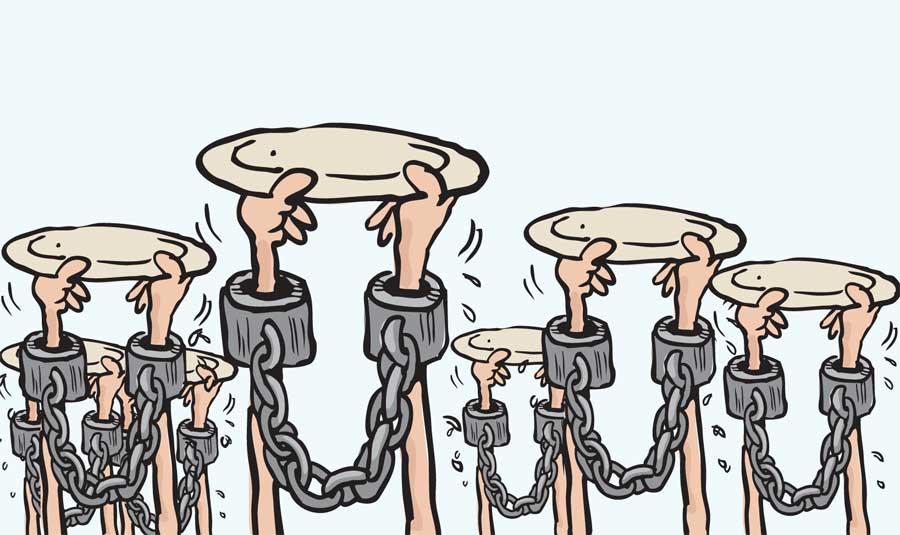21 Oct 2022 - {{hitsCtrl.values.hits}}

A large number of people are forced to taste the emptiness of hunger. Some are forced to rob items having great value or engage in petty thefts; all done to earn some dough to have at least one square meal for the day. And at the end of the day some of those less fortunate people are arrested and put in a police cell. All this happens when the lawmakers of the country have robbed from state coffers and are getting away with whatever questionable acts they are engaged in.
The government now maintains that all have to chip into pull this country from the dumps. Let’s give these lawmakers a reminder that it’s they who played pandu with our finances and made this country bankrupt. However, no lawmaker is seriously talking about seeking the assistance of the law to bring to book politicians who have robbed this country.
Political analysts are now warning us that there will be two Sri Lankas soon. One Sri Lanka will be represented by those who have amassed much wealth through business activities, but not done in a proper and legal manner. The other group will be represented by people who have lost their businesses, jobs and sources of income and are struggling to make ends meet. The latter will be referred to as the ‘New poor class’. This idea has been underscored and explained in detail by columnist Jayadeva Uyangoda in his article penned for the September 25 edition of ‘Anidda’ –a Sinhala newspaper- under the headline ‘A social war that could take place in a Sri Lanka that’s fast dividing’.
Even now we see individuals- quite smartly dressed- boarding buses and begging for money. These individuals do get a fair collection when they do one round in a bus. These individuals get a substantial amount of money during their begging rounds because their approach to the task at hand is genuine.
But on the other side of Sri Lanka are the new rich individuals and business communities who have exploited the people; first during the pandemic and now during the worst of the economic crisis. Owners of hospitals, banks, financial institutions, vendors selling cars and import and export merchants have capitalized on the hard times that the people have faced in recent times.
What’s not really fair is that when these people are struggling to pay their water and electricity bills some of our lawmakers have defaulted on making such payment.
And while all what is not so rosy is taking place the president of this country is making requests from the media to stick to reporting on the government’s programme aimed at rebuilding the economy.
This regime doesn’t like the social media outlets because they produce content which is both positive and negative. The social media is quick to highlight when government authorities arrest peaceful protesters. The same media is also playing watchdog to the nation and compiles quick reports when a lawmaker gets a red notice for an unpaid water or electricity bill. The regime also hates the social media because it reports in a flash when lawmakers at a public rally are hooted at by a crowd and eventually see their presence being rejected. The government in reality hates the truth being reported on; the truth that the critics, the opposition parties and those who want a system change wish to know.
There is much debate about the programme the government wants to initiate to rehabilitate people. According to what we know people engaged in terrorism were sent through a rehabilitation programme and most of them stepped back into the society and are employed gainfully. But there is much debate about a clause in this latest government programme which allows the state to send for rehabilitation a person who they think needs be rehabilitated. This is rather tricky and should be debated because a peaceful protester can be rounded up and sent for rehabilitation.
Let’s hope that the government will lend an ear to the voice of the people which highlights the lack of both resources and income these days and the complaints against the human touch which the state is fast losing.
10 Jan 2025 1 hours ago
10 Jan 2025 1 hours ago
10 Jan 2025 2 hours ago
10 Jan 2025 3 hours ago
10 Jan 2025 3 hours ago